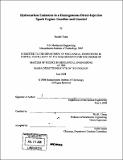Hydrocarbon emissions in a homogeneous direct-injection spark engine : gasoline and gasohol
Author(s)
Tharp, Ronald S
DownloadFull printable version (9.608Mb)
Other Contributors
Massachusetts Institute of Technology. Dept. of Mechanical Engineering.
Advisor
Wai K. Cheng.
Terms of use
Metadata
Show full item recordAbstract
In order to better understand the effects on hydrocarbon emissions of loading, engine temperature, fuel type, and injection timing, a series of experiments was performed. The effect of loading was observed by running the engine at a higher temperature and more open throttle than would typically be observed at fast idle or low load driving. The effects of coolant temperature, the charge motion control valve, spark timing and rail pressure were tested through holding all other variables constant and sweeping through different injection timing to observe the effect on emissions and power output. A new fuel system was designed to allow for the quick testing of different ethanol blends. The system allowed for comparison testing of an 85% ethanol blend to UTG 91 as a function of coolant temperature and injection timing. Measurement of cylinder pressure and hydrocarbon emissions near the exhaust valve allowed for a better understanding of engine operation and the effect of using high ethanol content fuels. Initial testing was also done on 15% and 40% ethanol blends. The results revealed that engine emissions decrease as a function of reduced loading and higher engine temperatures. Sweeps of injection timings for all fuels demonstrated high hydrocarbon emissions for earlier injection timings which fell as injection timing was retarded. A secondary peak was observed in hydrocarbon emissions for an injection timing of approximately 150 CAD aTDC intake. Analysis of rate of fuel injection vs. indicated power revealed a steady decrease in indicated efficiency as injection timing was retarded up to 120 CAD aTDC Intake and then a slow rise in efficiency as the timing was further retarded. The exact causes of the decrease in engine efficiency are unknown; however, possible explanations involve increased heat transfer from the cylinder and piston, fuel loss, and inefficient combustion due to impingement on cold surfaces.
Description
Thesis (S.M.)--Massachusetts Institute of Technology, Dept. of Mechanical Engineering, 2008. Includes bibliographical references (p. 85).
Date issued
2008Department
Massachusetts Institute of Technology. Department of Mechanical EngineeringPublisher
Massachusetts Institute of Technology
Keywords
Mechanical Engineering.